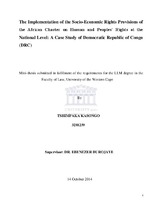| dc.description.abstract | This mini-thesis examines the issue of the implementation of the socio-economic rights provisions of the African Charter on Human and Peoples‘ Rights (ACHPR) at the national level, in a case study of Democratic Republic of Congo (DRC). These rights which comprise the right to property, the right to work, the right to health, the right to education and the protection of the family and cultural rights in Articles 14 to 18 of the ACHPR are provided for and guaranteed in the DRC Constitution of 18 February 2006 in Articles 34 to 48 and, accordingly, are legally enforceable under the Constitution. This study was motivated by the fact that despite the enforceability of these rights under the DRC Constitution, the real situation in the DRC remains worrying in that the economic, social and cultural rights (ESCR) of the ACHPR are violated from day to day by the government. The majority of Congolese live in poverty, disease and ignorance; they lack jobs, food and other basic necessities, such as, water and electricity, in spite of DRC‘s abundant natural resources (such as, oil and gas); minerals (such as cobalt, vanadium, manganese, phosphate, and bauxite); iron ore; and precious tropical rain forests. This situation is due to certain reasons, including: bad governance; mismanagement of public finances by political authorities at the expense of the majority; lack or weakness of the institutions or organs of implementation; and the ignorance of the Congolese people about their socio-economic rights even if they are massively violated by their government. Consequently, the marginalisation of socio-economic rights which results in their non-protection and non-realisation in DRC leads to a low expectation of the State and Government by the people, corruption, exclusion, racism, xenophobia, inequality, diseases, poverty, a feeling of betrayal of the people, a crisis of state and governmental legitimacy, popular insurrections and civil war in the country. To prevent the above consequences requires the DRC State to comply with Article 1 of the ACHPR which declares that the Member States of the Organization of African Unity that are parties to the ACHPR shall recognise the rights, duties and freedoms enshrined in it and shall undertake to adopt legislative or other measures to give effect to them. In addition, as the ACHPR complements human rights protection at the domestic level where the rights protected in the Charter should be realised, it is important for DRC to ensure that the ESCR of the ACHPR protected in its Constitution are given full legal effect under domestic law, such that the Charter‘s rights are made justiciable. | en_US |

